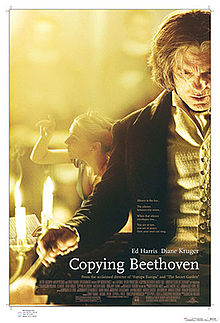- Copying Beethoven
-
Copying Beethoven 
Theatrical posterDirected by Agnieszka Holland Produced by Christopher Wilkinson Written by Stephen J. Rivele Starring Ed Harris
Diane KrugerDistributed by Metro-Goldwyn-Mayer Release date(s) November 10, 2006 Running time 104 minutes Country United States Language English Budget ~ US$11,000,000 Copying Beethoven is a 2006 dramatic film released by Metro-Goldwyn-Mayer and directed by Agnieszka Holland which gives a fictional take on the triumphs and heartaches of Ludwig van Beethoven's last years.
Contents
Synopsis
A fictionalized version of the last three years of Beethoven's life, beginning with the composition of the Ninth Symphony. It is set in 1824 as Beethoven (Ed Harris) is finishing his new symphony. He is plagued by deafness, loneliness and personal trauma. A fictional character, a new copyist, Anna Holtz (Diane Kruger) is engaged to help the composer finish preparing the score for the first performance. Anna is a young conservatory student and aspiring composer. Her understanding of his work is such that she corrects mistakes he has made, while her personality opens a door into his private world. Beethoven is initially skeptical, but slowly comes to trust Anna's assistance and eventually grows fond of her. By the time the piece is performed, her presence is a necessity and she helps him conduct the premier from a spot hidden amongst the orchestra.
After the premiere, they collaborate and become closer. His eccentricities become more and more troublesome, but Anna continues to provide companionship. She eventually transcribes his compositions as he simply talks her through them.
Cast
- Diane Kruger – Anna Holtz
- Ed Harris – Ludwig van Beethoven
- Matthew Goode – Martin Bauer
- Phyllida Law – Mother Canisius
- Joe Anderson – Karl van Beethoven
- Ralph Riach – Wenzel Schlemmer
Artistic license
The working manuscript of the score is attributed to two copyists,[1] both of whom were male, not a single female as depicted in the film.
The actual copyists neither contributed to nor altered the score, and as shown in the film were berated by Beethoven for any deviation that occurred from the original score.[2]
The movie is set in 1824 during the composition of Beethoven's Ninth Symphony. Throughout the movie Beethoven is shown to be hard of hearing but quite capable of understanding people who speak loudly. In reality, Beethoven had lost much of his hearing seven years earlier (1817). Beethoven never experienced permanent deafness; his condition fluctuated between total silence and terrible tinnitus. The Ninth Symphony was composed at a time when Beethoven's hearing had deteriorated severely. At this point in his life, most of Beethoven's conversations were facilitated by the use of notebooks. It can be argued, however, that he was also able to read people's lips, evidenced by his insistence that people face him when they spoke to him.
In the film, Beethoven makes an allusion to the Moonlight Sonata. This is an anachronism as the Sonata No. 14 "quasi una fantasia" was not referred to as "Moonlight" until 5 years after his death. The reference to the Appassionata piano sonata in the same scene is similarly anachronistic.
The Ninth Symphony premiere
Much of the film centers on Beethoven's insistence on conducting his own work, particularly the premiere of his Ninth Symphony (1824). The arrangement of sharing the work of conducting so that Beethoven could appear on the podium and influence the performance despite his deafness, actually did take place. Beethoven's colleague was named Michael Umlauf, the musical director of the Kärntnertor theater where the premiere took place. The two stood together on the podium; Umlauf did not lurk secretly amid the orchestra players as in the film.
The tale that Beethoven had to be turned around to be aware of the audience's applause is apparently authentic.
For further details on the premiere, see Symphony No. 9 (Beethoven).
Critical reception
The film received mixed reviews. On the Metacritic website it received a score of 59.
References
- ^ BBC News (22 May 2003). "Beethoven's Ninth fetches £2.1m". BBC. http://news.bbc.co.uk/2/hi/entertainment/3049061.stm.
- ^ Fischer, George Alexander (1905). Beethoven, a Character Study: Together with Wagner's Indebtedness to Beethoven. Harvard University Press. p. 188. "He might write about patience in his note-book, but it was exercised very little when dealing with copyists. There were times in this connection in which the situation became so strained that they refused to work for him."
External links
- Official site
- Copying Beethoven at the Internet Movie Database
- The Times Film Review: Copying Beethoven
- Biography
- Copying Beethoven at Metacritic.com
Films directed by Agnieszka Holland 1980s 1990s Europa Europa (1990) · Olivier, Olivier (1992) · The Secret Garden (1993) · Total Eclipse (1995) · Washington Square (1997) · The Third Miracle (1999)2000s Julie Walking Home (2002) · Copying Beethoven (2006)2010s In Darkness (2011)Categories:- American films
- English-language films
- 2006 films
- Films about classical music and musicians
- Ludwig van Beethoven in popular culture
- Films shot in Budapest
- Films directed by Agnieszka Holland
- Films set in the 1820s
Wikimedia Foundation. 2010.
